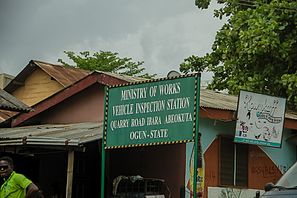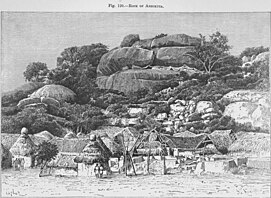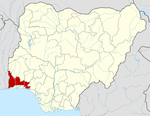Abeokuta
This article needs additional citations for verification. (April 2012) |
Abeokuta | |
|---|---|
City | |
 Abeokuta from Olumo Rock | |
 Abeokuta Location in Nigeria | |
| Coordinates: 7°9′39″N 3°20′54″E / 7.16083°N 3.34833°ECoordinates: 7°9′39″N 3°20′54″E / 7.16083°N 3.34833°E | |
| Country | |
| State | Ogun State |
| Founded | 1830 |
| Area | |
| • City | 879 km2 (339 sq mi) |
| Elevation | 66 m (217 ft) |
| Population (2006[1]) | |
| • City | 451,607 |
| • Density | 510/km2 (1,300/sq mi) |
| • Metro | 1,117,000 |
| Climate | Aw |
Abeokuta is the state capital of Ogun State in southwest Nigeria. It is situated on the east bank of the Ogun River, near a group of rocky outcrops in a wooded savanna;[2] 77 kilometres (48 mi) north of Lagos by railway, or 130 kilometres (81 mi) by water. As of 2006, Abeokuta and the surrounding area had a population of 449,088.
Geography and economy[]
Abẹokuta lies in fertile country of wooded savanna, the surface of which is broken by masses of grey granite. It spreads over an extensive area, being surrounded by mud walls 18 miles in extent.[3] Palm oil, lumber, natural rubber, yams, rice, cassava, maize, cotton, other fruits, and shea butter are the chief articles of trade. It is a key export location for cocoa, palm products, fruit, and kola nuts.[2] Both rice and cotton were introduced by the missionaries in the 1850s and have become integral parts of the economy, along with the dye indigo.
Abeokuta lies below the Olumo Rock, home to several caves and shrines.[4] The town depends on the Oyan River Dam for its water supply, which is not always dependable.[5] The dam is situated in the Abeokuta North local government area of Ogun State in the West of Nigeria, about 20 km northwest of the state capital Abeokuta. The dam crosses the Oyan River, a tributary of the Ogun River.
Abeokuta is the headquarters of the federal Ogun-Oshun River Basin Authority, which is responsible for development of land and water resources for Lagos, Ogun, and Oyo states. Included in this are irrigation, food-processing, and electrification.[2]
Local industries include but not limited to fruit canning plants, plastics, breweries, sawmills, and an aluminum products factory. South of town are the Aro granite quarries.[2]
Transportation[]

Abeokuta is connected to nearby Lagos by a railway that was completed in 1899, with a length of 77 kilometres (48 mi). Roads connect it to Lagos as well as Ibadan, Ilaro, Shagamu, Iseyin, , and Ketou.[2]
History[]
Chief Sodeke first settled Abeokuta (meaning literally "the underneath of the rock"[6] or indirectly "refuge among rocks")[2] in 1830 as a place of refuge from slavehunters from Dahomey and Ibadan. The village populations scattered over the open country to take refuge among the rocks surrounding the city. Here they formed a free confederacy of many distinct groups, each preserving the traditional customs, religious rites and the names of their original villages.[3]
The original settlers of Abeokuta were of the Egba nation, descendants of Eso Ikoyi chiefs that had followed the first Alake of the Egba when he left Oyo during the reign of an early Alaafin and joined him to establish the Egba homeland in the Egba forest.[7] Later, when their descendants fled said homeland in the Oyo Empire (which they had previously been subject to and which was now collapsing spectacularly), they began to wander from place to place—a state of affairs which continued until they finally discovered Abeokuta.[2] Eventually, some members of other Yoruba clans came to the settlement as well. Baptist and Anglican missionaries from Great Britain began to serve the area in the 1840s,[2][7] in addition to Sierra Leonean creoles and Brazilian returnees.
Because Abeokuta was in a key location for the palm oil trade and because it was the so-called capital of the Egbas, Dahomey soon became hostile. In the 1851 Battle of Abeokuta, the Egba defeated King Gezo and the Dahomey incursion. They again beat back the Dahomey military in 1864.[2][7]

The 1860s also saw problems arise with the Europeans, namely the British in Lagos, which led to the Egba first closing trade routes, followed by the expulsion of missionaries and traders in 1867.[2] Between 1877 and 1893 the Yoruba Civil Wars occurred, and Abeokuta opposed Ibadan, which led the king or alake of the Egba to sign an alliance with the British governor, Sir Gilbert Carter. This occurred in 1893, which formalized the Egba United Government based in Abẹokuta which became recognized by the United Kingdom.[2] In 1914, the Egba lands were incorporated into the colony of Nigeria by the British, with Abeokuta as the provincial capital.[2][7]
In 1918, an uprising took place, the Adubi War, which was related to the levying of taxes and the policy of indirect rule by Sir Frederick Lugard, the British Governor-General.[2] This was the only internal threat to British control of Nigeria during the course of the First World War.[8]
The Abeokuta Women's Revolt, led by the Abeokuta Women's Union (AWU), took place in the 1940s. It was a resistance movement against the imposition of unfair taxation by the Nigerian colonial government.[9]
In 1976, Abeokuta became the capital of the newly created Ogun State.
Notable buildings[]
Abeokuta was once surrounded by 18 miles of wall,[8] and remnants of the historic wall still exist today. Ake, the traditional residence of the Alake, along with Centenary Hall (1930), are both in the Egba Alake's territory. There are secondary and primary schools and the University of Lagos Abeokuta Campus opened in 1984.[2] This campus specializes in science, agriculture, and technology. This has since been changed to an independent full-fledged tertiary institution, Federal University of Agriculture, Abeokuta (FUNAAB) in 1988.
The Green Legacy Resort is a large resort/hotel[10] built by former president Olusegun Obasanjo and investors. The Olusegun Obasanjo Presidential Library (OOPL) is also located within the grounds of the resort
The Governor's office located at Oke-Mosan is also a notable building. The Federal University of Agriculture, Abeokuta (FUNAAB) located at Alabata road in Abeokuta is also one of the notable buildings in Abeokuta and one of the most beautiful public University campus in Nigeria.[11][12]
Notable people[]
- Shane Lawal, basketball player.[13]
- Princess Sara Forbes Bonetta, Egbado princess of the Yoruba people, goddaughter of Queen Victoria.
- Madam Tinubu,[14][15] titled aristocrat.
- Chief Moshood Kashimawo Olawale Abiola, businessman, politician and presidential candidate.[16][17]
- Chief Olusegun Obasanjo, President of Nigeria from 1999 to 2007.
- Chief Funmilayo Ransome-Kuti, women's rights activist.[18][19][20]
- Prince Bola Ajibola, former World Court judge.[21]
- Chief Frederick Rotimi Williams, legal scholar.
- Chief Akintola Williams, accountant, founder of ICAN.[22]
- Princess Kuforiji Olubi, former federal minister.
- Professor Wole Soyinka, Nobel Prize-winning author.[23][24]
- Professor Olikoye Ransome-Kuti, professor of pediatrics, former Minister of Health.[25]
- Fela Kuti, musician and political activist.[26]
- Tunji Oyelana, musician, actor, folk singer and composer.
- Chief Ernest Shonekan, businessman and former head of the defunct interim government of Nigeria.
- Jimi Solanke, actor, musician, storyteller and playwright.
- Ebenezer Obey, juju musician and evangelist.
- Chief Olusegun Osoba, politician and businessman.
- Dr. Tunde Bakare, pastor.[27][28]
- Oladimeji Bankole, politician and businessman.[29][30]
- Oba Adedotun Aremu Gbadebo III, monarch and businessman.
- Segun Odegbami, footballer and sports analyst.[31]
- Mudashiru Lawal, footballer and sports analyst.[32]
- Ike Shorunmu, footballer and coach.
- Oba Adedapo Tejuoso, monarch and businessman.[33][34]
- Chief Bisoye Tejuoso, businesswoman and titled aristocrat.[35]
- Sir Shina Peters, musician and businessman.
- Akin Ogungbe, film actor, film maker, producer and director.[36]
- Lijadu Sisters, identical twin sisters that were an iconic music pair in Africa between the 1960s and 1980s.
- Chief Simeon Adebo, a Nigerian administrator, lawyer and diplomat.[37]
- Odunlade Adekola: Nollywood Actor[38][39]
Photo gallery[]
- Some important places in Abeokuta

Akin Olugbade Social Centre, Owu, Abeokuta, Ogun state

Abeokuta Girls Grammar School, Onikolobo, Abeokuta, Ogun state

Entrance of Olumo Rock

Moshood Abiola Polytechnic, Main Entrance

Owu entrance to Chief Olusegun Obasanjo family house

Ministry of works vehicle inspection station sign-post, Abeokuta, Ogun state

Kuto Road in Abeokuta.

The "Rock of Abeokuta", as drawn c.1892

Aerial view of Abeokuta, 1929

Diocese of Egba (Anglican Communion)

Alaba Lawson School, Abeokuta

Anglican church, Abeokuta

Alhaji M.A. Tijanni (Baba MAT), Asero, Abeokuta

Cathedral of St. Peter Anglican church, Abeokuta

Cathedral of St. Peter Anglican church, Abeokuta

Church Cathedral, Ibara, Abeokuta

Cinema at Olusegun Obasanjo Presidential Library, Abeokuta.jpg

Central Bank of Nigeria, Abeokuta

Conference Hotel, Abeokuta

Egba High School, ABeokuta

General Post Office, Sapon, Abeokuta.jpg

Green Legacy Resort, Abeokuta

High Court building, Abeokuta.jpg

Ibara Market mall, Abeokuta.jpg

Ibara Market mall, Abeokuta.jpg

Ogun Government House, Abeokuta

Ogun Tech-Hub building, Abeokuta

Olubara of Ibara palace, Abeokuta

Olusegun Obasanjo hilltop G.R.A, Abeokuta

OPIC building, Abeokuta.jpg

Osile of Egba land palace, Abeokuta2.jpg

Salawu Abiola Comprehensive School, Abeokuta2.jpg

St. Centenary hall, Abeokuta

St. John church, Sagamu
References[]
- ^ "FEDERAL REPUBLIC OF NIGERIA : 2006 Population Census" (PDF). Archived from the original (PDF) on 5 March 2012. Retrieved 25 July 2016.
- ^ Jump up to: a b c d e f g h i j k l m n Hoiberg, Dale H., ed. (2010). "Abeokuta". Encyclopædia Britannica. I: A-ak Bayes (15th ed.). Chicago, IL: Encyclopædia Britannica Inc. pp. 27. ISBN 978-1-59339-837-8.
- ^ Jump up to: a b One or more of the preceding sentences incorporates text from a publication now in the public domain: Chisholm, Hugh, ed. (1911). "Abeokuta". Encyclopædia Britannica. 1 (11th ed.). Cambridge University Press. p. 42.
- ^ Kola Tubosun (16 April 2014). "Abeokuta's Living History". KTravula.com.
- ^ Dimeji Kayode-Adedeji (February 23, 2010). "Water scarcity bites harder in Abeokuta". Next. Archived from the original on June 10, 2015. Retrieved May 22, 2010.
- ^ Bennett, Eric (2010). Encyclopedia of Africa. Oxford: Oxford University Press. ISBN 9780199733903. Retrieved 18 January 2017.
- ^ Jump up to: a b c d Canby, Courtlandt. The Encyclopedia of Historic Places. (New York: Facts on File Publications, 1984), p. 2.
- ^ Jump up to: a b "Abeokuta". Encyclopaedia Britannica. 1 (14 ed.). 1930. p. 34.
- ^ Byfield, Judith A. (2003). "Taxation, Women, and the Colonial State: Egba Women's Revolt". Meridians: Feminism, Race, Transnationalism. 3 (2): 250–77. JSTOR 40338582.
- ^ Olokesusi, Femi (1990-01-01). "An assessment of hotels in Abeokuta, Nigeria and its implications for tourists". International Journal of Hospitality Management. 9 (2): 125–134. doi:10.1016/0278-4319(90)90007-K. ISSN 0278-4319.
- ^ "Is This The Most Beautiful University Campus in Nigeria? [See Pics]". 21 December 2016.
- ^ "is this the most beautiful university campus in Nigeria?". NigerianFacts.com. Retrieved 12 February 2019.
- ^ "Shane Lawal, atleticità senza fine". Metropolitan Magazine (in Italian). 2020-10-09. Retrieved 2021-06-27.
- ^ editor (2021-01-10). "133 Years After, Family, Well Wishers Celebrate Madam Efunroye Tinubu, the Yoruba Unsung Heroine". THISDAYLIVE. Retrieved 2021-06-27.CS1 maint: extra text: authors list (link)
- ^ "Madam Efunroye Tinubu: The Indomitable Iyalode". The Guardian Nigeria News - Nigeria and World News. 2020-01-26. Retrieved 2021-06-27.
- ^ editing (2021-06-12). "JUNE 12 SPECIAL: Short Profile of Late Chief MKO Abiola". Sahara Reporters. Retrieved 2021-06-27.
- ^ "The legend called M.K.O". The Guardian Nigeria News - Nigeria and World News. 2019-06-12. Retrieved 2021-06-27.
- ^ "An Unforgettable Train Trip To Abeokuta". The Guardian Nigeria News - Nigeria and World News. 2021-04-25. Retrieved 2021-06-27.
- ^ "Google pays tribute to the late Funmilayo Ransome-Kuti — here is what you need to know about this fearless Nigerian icon". Pulse Nigeria. 2019-10-25. Retrieved 2021-06-27.
- ^ "Heroes of the struggle for Nigeria's independence/pioneer political". The Guardian Nigeria News - Nigeria and World News. 2020-10-01. Retrieved 2021-06-27.
- ^ "Bola Ajibola at 85: A judge must be free of iniquity..." Vanguard News. 2019-04-28. Retrieved 2021-06-27.
- ^ "Akintola Williams hits 100, soldiers on". The Guardian Nigeria News - Nigeria and World News. 2019-08-09. Retrieved 2021-06-27.
- ^ "An Unforgettable Train Trip To Abeokuta". The Guardian Nigeria News - Nigeria and World News. 2021-04-25. Retrieved 2021-06-27.
- ^ "Wole Soyinka decries 'cattle imperialism,' confirms attack". The Guardian Nigeria News - Nigeria and World News. 2021-02-12. Retrieved 2021-06-27.
- ^ "An Unforgettable Train Trip To Abeokuta". The Guardian Nigeria News - Nigeria and World News. 2021-04-25. Retrieved 2021-06-27.
- ^ "An Unforgettable Train Trip To Abeokuta". The Guardian Nigeria News - Nigeria and World News. 2021-04-25. Retrieved 2021-06-27.
- ^ "PASTOR BAKARE AT 66: Youths aren't Nigeria's problem, I once apologised that we failed them". Vanguard News. 2020-11-15. Retrieved 2021-06-27.
- ^ TODAY (2018-06-30). "In Pictures: VP Osinbajo attends funeral service of Pastor Bakare's mum". TODAY. Retrieved 2021-06-27.
- ^ "Dimeji Bankole to remarry, weds Kebbi governor's daughter". The Guardian Nigeria News - Nigeria and World News. 2021-01-13. Retrieved 2021-06-27.
- ^ "Dimeji Bankole weds Kebbi governor's stepdaughter in low-key ceremony | The Nation". Latest Nigeria News, Nigerian Newspapers, Politics. 2021-01-17. Retrieved 2021-06-27.
- ^ "Tribute to our mother". The Guardian Nigeria News - Nigeria and World News. 2018-03-17. Retrieved 2021-06-27.
- ^ Shittu, Ibitoye (2019-04-26). "Mudashiru Lawal is first African to appear in 5 consecutive Nations Cup". Legit.ng - Nigeria news. Retrieved 2021-06-27.
- ^ "Oba Adedapo Tejuoso: It never occured [sic] to me I could become king". Vanguard News. 2020-09-13. Retrieved 2021-06-27.
- ^ "I wish to die in Christ – Oba Tejuoso". Punch Newspapers. 2019-11-23. Retrieved 2021-06-27.
- ^ "Oba Adedapo Tejuoso: It never occured to me I could become king". Vanguard News. 2020-09-13. Retrieved 2021-06-27.
- ^ "We were shooting a movie, then they came with guns and robbed us of everything we had —Segun Ogungbe". Tribune Online. 2019-12-14. Retrieved 2021-06-27.
- ^ "Simeon Adebo: The Unforgettable Civil Servant -". The NEWS. 2017-05-20. Retrieved 2021-06-27.
- ^ "Inside Odunlade Adekola's Family Life With Wife Ruth and The Children They Share". BuzzNigeria - Famous People, Celebrity Bios, Updates and Trendy News. 2021-04-09. Retrieved 2021-06-27.
- ^ "Six Nollywood actors turned meme kings". Punch Newspapers. 2021-06-01. Retrieved 2021-06-27.
External links[]
![]() Media related to Abeokuta at Wikimedia Commons
Media related to Abeokuta at Wikimedia Commons
- Abeokuta
- Populated places in Ogun State
- State capitals in Nigeria
- Cities in Yorubaland
- Cities in Nigeria
- 1825 establishments in Africa




































